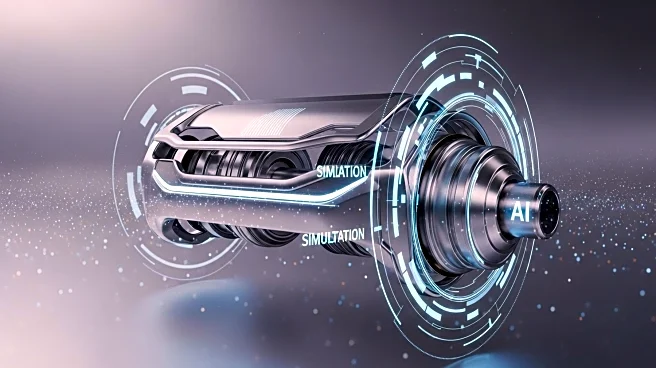What is the story about?
What's Happening?
Sumitomo Riko, a global manufacturer of high-performance rubber automotive components, has adopted Ansys SimAI technology to significantly accelerate its engineering simulation processes. This implementation allows Sumitomo Riko to achieve a simulation speedup of over 10 times compared to traditional methods, reducing prediction time to under five minutes. The technology is being used to rapidly generate high-fidelity models for tasks such as anti-vibration design, battery cooling, magnetic field analysis, and heat-transfer analysis. This advancement enables design time savings of more than an hour per new design, enhancing product lifecycle management processes. The initiative is part of Sumitomo Riko's efforts to remain at the forefront of polymer and comprehensive evaluation technology innovation.
Why It's Important?
The adoption of Ansys SimAI technology by Sumitomo Riko is significant for the automotive industry as it enhances the efficiency and speed of product development. By reducing simulation time, the company can accelerate design iterations and improve workflow efficiency, which is crucial in a competitive market. This technological advancement allows engineers to make data-driven decisions quickly, potentially reducing costs associated with prototyping and testing. The ability to predict performance accurately in a short time frame can lead to faster time-to-market for new products, benefiting both the company and consumers. Additionally, the integration of AI in engineering processes represents a broader trend towards automation and innovation in manufacturing.
What's Next?
Sumitomo Riko plans to continue working with Ansys to implement workflow automation capabilities across product design, manufacturing, and retirement processes. This ongoing collaboration aims to further streamline operations and enhance the company's ability to innovate. As AI technology becomes more integrated into engineering processes, other companies in the automotive sector may follow suit, adopting similar technologies to remain competitive. The focus on AI-driven solutions is likely to expand beyond automotive components, influencing other areas of manufacturing and engineering.
Beyond the Headlines
The use of AI in engineering simulations raises important considerations regarding the role of human expertise in the design process. While AI can significantly speed up simulations and improve accuracy, it also necessitates a shift in skill sets for engineers, who must now work alongside advanced technologies. This development may lead to changes in educational curricula and professional training programs to equip engineers with the necessary skills to leverage AI effectively. Furthermore, the ethical implications of AI-driven design processes, such as accountability and transparency, will need to be addressed as the technology becomes more prevalent.















